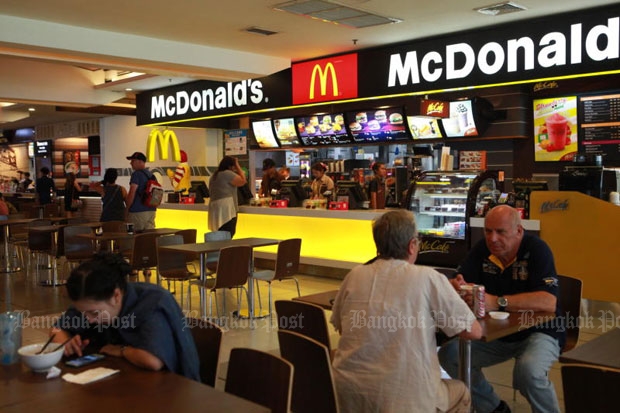
McDonald's Corp said the US restaurant industry would raise prices far more than supermarkets this year, sending a chill through a sector that is searching for ways to protect itself from higher worker wages.
The forecast and weak quarterly sales at domestic McDonald's restaurants sent shares in the world's biggest restaurant company down 4.5% to $121.71 and pulled down most of the restaurant sector. The Dow Jones US Restaurants & Bars Index was off 2.2%.
The world's biggest fast-food chain gets roughly one-third of its revenue and 40% of profits from the United States.
The food service industry is harder hit by state and local minimum wage increases because it employs more minimum wage workers than any other occupation. Some planned minimum wage hikes will more than double the prevailing wage to $15 per hour over time.
The second-quarter report from McDonald's landed after chains such as Dunkin' Brands Group Inc, Starbucks Corp and Wendy's Co also reported disappointing results for the latest quarter in large part due to weak customer traffic.
"Restaurant food inflation is outpacing the increases at supermarkets and the gap is widening,'' McDonald's chief financial officer Kevin Ozan said on a conference call with analysts.
"Food-at-home inflation is expected to be flat to up about 1% for this year, while food-away-from-home inflation is expected to be up 2.5% to 3.5%,'' he said.
"Restaurant companies, which are grappling with profit-squeezing minimum wage increases, use more labour than grocery stores and have the extra burden of trying to convince franchisees to hold back on price increases aimed at offsetting higher labour costs,'' Sanford C. Bernstein analyst Sara Senatore said.
"Food prices are coming down, but labour is not. That's doubly bad for restaurants," she said. "It's hard to convince everybody to operate in lock step."
When franchisees raise prices, Senatore said, "it just makes their prices look even higher relative to grocery stores."
Restaurant executives also pinned part of the blame for the second-quarter softness on the fractious US presidential election and uncertainty spawned by terrorist attacks around the world.
"I think generally there's just a broader level of uncertainty in consumers minds at the moment," chief executive Steve Easterbrook said on the company's earnings call.
While such events loom as a risk to US consumer spending, that threat was not enough to dissuade the National Retail Federation from boosting its retail sales growth forecast for the remainder of the year from 3.1% to 3.4%. The forecast excludes spending at restaurants.
"There are many factors that could prove to be hurdles but our overall outlook is optimistic," NRF chief economist Jack Kleinhenz said in a statement on Tuesday.
McDonald's sales at US restaurants open at least 13 months were up 1.8% in the quarter, far less than the 3.2% rise that analysts expected, according to research firm Consensus Metrix.
McDonald's executives said they expected labour cost pressures to continue, but declined to elaborate. They did, however, note that the company generally needed same-restaurant sales to increase 2 to 3% to maintain profits.
McDonald's total revenue declined 3.5% to $6.27 billion, in line with the average analyst estimate, according to Thomson Reuters I/B/E/S.
Net income in the quarter fell 9.1% to $1.09 billion, or $1.25 per share, in the quarter.
The company recorded pre-tax charges of about $230 million, or 20 cents per share, in the latest quarter related to its programme to sell company-owned stores to franchisees and relocation of its headquarters to Chicago.
Excluding items, McDonald's earned $1.45 per share, beating analysts estimate of $1.38.